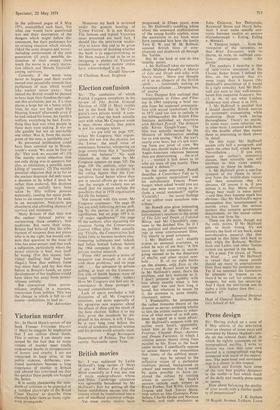Conservative pacifism
Sir: 'If one reads the old news- papers and periodicals of that time. which did so much to keep mili- tarism alive, one finds very little about glory and adventure and a constant harping on the disagree- ableness of invasion and subjuga- tion. in one word militarism was funk.' (From the chapter called 'The Ending of War' in Wells's novel of the atomic age. The World Set Free, 1914.) • In the spEcTAToR, for example— one of those old periodicals—some correspondents objections to Con- servative pacifism, which we find
in the yellowed pages of 8 May 1971, exemplified such fears. Yet what one would have questioned was not their description of the dangers which might follow dis- armament, but their preference for an existing situation which already risked the same dangers and worse: including enslavement of the next generation (if any); possible de- struction of their society (how much the worse in a war); starva- tion (ditto); and 'bloody fratricide' among survivors.
Certainly, if the worst were never to happen and their world moved ever peacefully towards that parliament of man which would take nuclear terror away: then indeed the British would be pleased to have kept their freedom through- out this evolution; just as, if a man places a large bet on a horse which wins, he may not feel much like blaming himself afterwards even if he had staked-his home, his family's welfare, everything he had. Every- thing they had was what people in those days were staking. It was no idle gamble but not an inevitable one either. Was it, from the stand- point of the time, a justifiable one?
Its presumed justification could have been summed up in Words- worth's words 'We must be free or die.' This took no account of: (1) The mainly moral objection that not only dying was in question but also, as retaliation, a possible mass killing of 'enemies'. (2) The mainly practical objection that in so far as the nuclear deterrent did only mean a decision to be killed if need be rather than enslaved, this decision might more usefully have been taken by fifty million persons separately, causing far more prob- lems to an enemy (even if he used, in an occupation, Nazi-style gas chambers) and affording chances of survival and resistance.
Many Britons of that time saw the nuclear 'defence' policy as maintaining their country's best traditions. But more than some, Britain had believed that the arbi- trament of weapons does not prove who is in the right, but merely sub- jects that question to the issue of who has most power; and that such a subjection, particularly where the power exercise is final, may itself be wrong. (For this reason, indi- vidual duelling had long been illegal.) Now that military force was more final, and lay less than before in Britain's hands, an apter development of her tradition would have taken her away from power- reliance entirely.
But conversion from power- reliance implied, in a measure, conversion from politics. This was the change in which it fell to—of course—politicians, to lead us.
The Advertiser



































 Previous page
Previous page